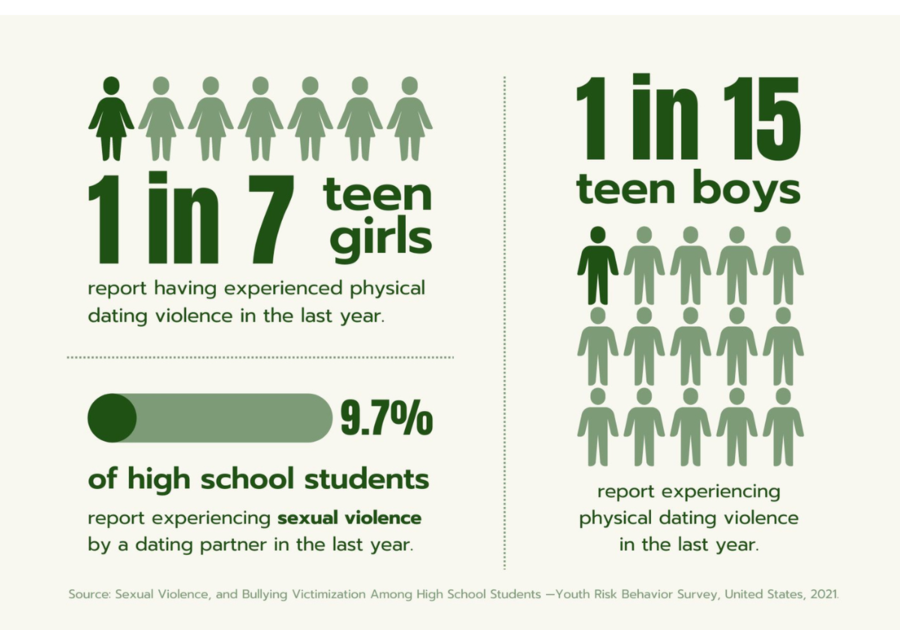Domestic violence in teen relationships is a topic not often talked about, but education about it is crucial! Educating our teens about what is normal in a relationship can help them stay safe, and also enables them to know where and who to turn to if they suspect a friend or loved one is possibly a victim of domestic violence.
What makes a relationship healthy? A healthy relationship is one where you feel safe and valued, can have fun together and apart, and you are always treated with respect. Healthy relationships make room for you to be an individual and have boundaries.
•Nearly 1 in 10 female teens and about 1 in 15 male high school students report having experienced physical dating violence in the last year.
•About 1 in 7 female and 1 in 25 male high school students report having experienced sexual dating violence in the last year.
•27% of women and 21% of men who were victims of contact sexual violence, physical violence, and/or stalking by an intimate partner in their lifetime first experienced violence by a partner before they turned 18.
•LGBTQ+ teens and American Indian/Alaska Native teens experience disproportionate rates of teen dating violence.

Here are some suggestions for framing the conversation with your teens. Some of these are taken from https://www.breakthecycle.org/sites/default/files/hanbook_-_parents_of_teen_0.pdf
•What is dating violence? Discuss what dating violence is. Dating violence is when one partner in a dating relationship uses abuse to maintain power and control over the other person in the relationship. It can take many forms, including threats, emotional abuse, insults, isolation from friends and family, name-calling and controlling what someone wears or with whom they socialize. It can also include sexual abuse..
• Conversation goals: Your first goal should be to show your child that you can be trusted to be a non-judgmental listener and a source of support. Your second goal should be to give your child strategies for dealing with unhealthy and abusive relationships. You can’t provide effective guidance without first establishing trust – listen more than you lecture.
•Share your own experiences, especially the ones when you were your teen’s age, made mistakes and learned from them.
Questions to Ask:
Some questions have been taken from https://www.breakthecycle.org/sites/default/files/hanbook_-_parents_of_teen_0.pdf
How are things going? Start your conversation with a general question – otherwise, your teen may feel like they are being examined.
What are your friend’s dating relationships like? What kinds of things do your friends expect from the people they are dating? Does anyone in a relationship ever track the other person’s location or look through their phone? Would you be okay with someone you date doing that?
Have you seen any kind of hurtful or abusive behavior between two people who are dating? You may bring up some of the warning signs of an abusive relationship. For example, do any of your friends ever act like they are walking on eggshells around their partner? Do you know anyone who has stopped hanging out with their friends and participating in their favorite activities since they started dating someone new?
Why might a person stay in an unhealthy or abusive relationship? This is an opportunity to demonstrate that you understand the complicated nature of unhealthy relationships, and you can be a trusted source of support. Some examples of reasons:
- They might not want to “give up” on the relationship or be single.
- They may be in love and want the violence to end, but not the relationship.
- If they are in an abusive relationship, they can feel like no one understands the abuser but them.
- They might fear that if their parents find out, they won’t let the couple date any longer.
- They may not have healthy relationships to compare this to, or they may see abusive behavior modeled at home.
- They might think this is just what “being in love” is like.
- They may worry that parents and family will be disappointed in them.
How would you help a friend who is in a scary or abusive relationship? Teens are more likely to tell friends about their experience with dating violence than their parents. Preparing your child to be a supportive friend can keep teens safe. Some tips you might offer:
- Listen to what your friend has to say, and don’t be judgmental.
- Let your friend know you are there for them whenever they need to talk, and that you are worried about them.
- Let them know that you won’t tell anyone about their situation if they don’t want that information shared— and then keep your word (unless you fear for their physical safety).
- Be specific about why you are concerned. Let your friend know about behavior you have seen and how it made you feel.
- Find someone knowledgeable about abuse that your friend can talk to and volunteer to go with them.

Warning Signs:
Signs from https://www.respondinc.org/wp-content/uploads/2019/01/TDV-Parent-Packet-1.pdf
Teens may be experiencing a variety of physical and emotional changes during this time of their life, and they may not readily share with you all of the changes they are experiencing. Be on the lookout for any of these potential signs:
Do you notice your teen:
•Spending less time with family and friends?
•Excessively text messaging, phone calling, emailing or visiting with their partner?
•Giving up things that used to be important to them?
•Having declining grades or missing school?
•Being pressured by a partner about what to do, where to go, or what to wear?
•Being worried about upsetting their boyfriend/girlfriend?
•Apologizing or making excuses for their boyfriend’s/girlfriend’s behavior?
•Has injuries that he/she tries to cover up or can’t explain?
•Has a partner who is extremely jealous or possessive?
•Being depressed or anxious?
•Has a partner that abuses other people or animals?
•Dressing differently?
*Note: These are warning signs. One or two signs do not necessarily mean that your child’s relationship is abusive - many can be natural changes that happen over the course of the teenage years. However, a persistent pattern of changed behavior due to a partner’s control or reactivity is cause for concern.
If your teen is in an abusive relationship:
Tips from https://www.thehotline.org/resources/talking-to-teens-about-relationship-abuse/
Accept what they are telling you. Listen and be supportive, even when you don’t understand or agree with their decisions. Emphasize that they deserve to be treated with respect and care – don’t criticize their partner, as this can make them defensive. Criticism and judgement can make them less likely to reach out to you for help when they need you.
Allow them to make up their own mind. Leaving an unhealthy or abusive relationship is difficult and may even be dangerous. While you may have more years of experience with relationships than they do, they know the circumstances of their own relationship far better than you do. Remember that abuse is about power and control; making decisions for them can only add to the disempowerment they’re already experiencing from their partners.
Don’t prevent them from seeing their partner. Controlling their actions will make them more likely to keep secrets from you. Avoid taking their decision-making away from them – as this is a tactic they may already be experiencing in their abusive relationship. Remember that forcing this is something that their partner might use to manipulate and use as “proof” that other people are the problem.
Don’t post information about them on social media. Never use social media platforms to reveal your child’s location or where they spend time. A partner who is abusing them may be able to use your posts to find them.
Don’t give up. Your instinct is probably to remove your child from harm’s way immediately. However, abusive situations aren’t that simple. Even though helping them can be frustrating when you don’t understand or agree with their decisions, they need to know that they can trust you and depend on you for support. Make decisions that let them know that you’re there for them.
Sources:
1 Clayton HB, Kilmer G, DeGue S, et al. Dating Violence, Sexual Violence, and Bullying Victimization Among High School Students —Youth Risk Behavior Survey, United States, 2021. MMWR Suppl 2023;72(Suppl-1):66–74. DOI: http://dx.doi.org/10.15585/mmwr.su7201a8
2. Leemis R.W., Friar N., Khatiwada S., Chen M.S., Kresnow M., Smith S.G., Caslin, S., & Basile, K.C. (2022). The National Intimate Partner and Sexual Violence Survey: 2016/2017 Report on Intimate Partner Violence. Atlanta, GA: National Center for Injury Prevention and Control, Centers for Disease Control and Prevention.
3. https://www.breakthecycle.org/sites/default/files/hanbook_-_parents_of_teen_0.pdf
4 https://www.respondinc.org/wp-content/uploads/2019/01/TDV-Parent-Packet-1.pdf
5 https://www.thehotline.org/resources/talking-to-teens-about-relationship-abuse/
Peace at Home Family Shelter is a nonprofit organization providing shelter, services, and support to adults and children fleeing domestic violence in Northwest Arkansas. Our mission is to empower survivors to thrive by nurturing their self-determination and courage; and to promote healthy relationships and compassionate communities through education, outreach, and advocacy. Macaroni Kid Fayetteville is grateful for their important work and for their assistance with this article.



